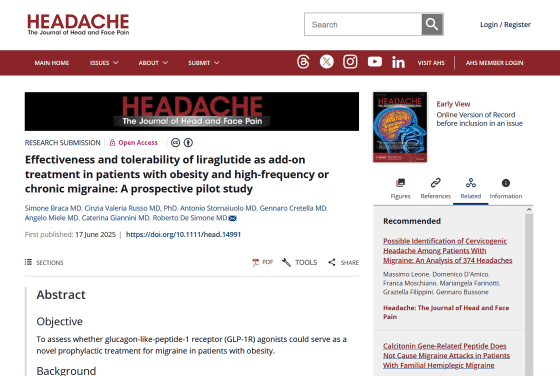Study reveals that type 2 diabetes drug could halve number of painful migraine days

Effectiveness and tolerability of liraglutide as add-on treatment in patients with obesity and high-frequency or chronic migraine: A prospective pilot study - Braca - Headache: The Journal of Head and Face Pain - Wiley Online Library
https://headachejournal.onlinelibrary.wiley.com/doi/10.1111/head.14991

Drug slashes migraine days by half in early trial — and it may work with completely 'new mechanism' | Live Science
https://www.livescience.com/health/medicine-drugs/drug-slashes-migraine-days-by-half-in-early-trial-and-it-may-work-with-completely-new-mechanism
Idiopathic intracranial hypertension is a disease that presents symptoms very similar to migraines, in which intracranial pressure , the pressure generated inside the skull, rises and causes a variety of symptoms. In particular, the type that does not involve papilledema, in which the optic nerve exits the optic disc swells, is said to be clinically difficult to distinguish from chronic migraines. The similarities between these diseases suggest that there is a deep connection between intracranial pressure and migraines, and that controlling intracranial pressure may be an effective way to treat migraines.
In a paper published in the medical journal Headache in June 2025, a research team led by Simone Braca, a neuroscientist at the University of Naples Federico II in Italy, reported the results of an experiment in which liraglutide, a drug used to treat type 2 diabetes, was administered to migraine patients.
Liraglutide is a GLP-1 receptor agonist that acts on the receptor for the gastrointestinal hormone GLP-1, and GLP-1 receptor agonists have been shown to significantly reduce intracranial pressure.

In the study, 31 obese patients with frequent or chronic migraines were given 0.6 mg of liraglutide daily for one week, followed by 1.2 mg daily for 11 weeks. These patients were selected because they had responded poorly to other migraine medications.
The results showed that about half of the patients reported a halving in the number of migraine days they suffered per month, with the average number of migraine days per month dropping dramatically from 20 to 9. Braca told Live Science that this was a 'huge' effect.
Seven of the patients experienced a 75% reduction in the number of migraine days, one patient experienced no migraines at all, and overall the impact of migraines on daily life was significantly reduced. Importantly, patients did not lose weight over the course of the study, suggesting that the improvement in migraines was not related to weight loss.

Treating migraines with a diabetes medication is an innovative idea, but some say the results should be taken with caution. Alex Sinclair , a professor of neuroscience at the University of Birmingham in the UK, who was not involved in the study, points out that the study was conducted on a small group of people and did not include a control group that did not receive liraglutide.
'This is a really fascinating study that gives us some really interesting ideas about the mechanism of delivery of migraine medication, but it's still in its early stages,' Sinclair told Live Science. 'In headache studies, the placebo effect is very prominent.'
Braca agreed that the study has limitations, but he said the results are promising, saying, 'The failure of multiple previous treatments and the magnitude of the observed responses make it unlikely that a significant placebo effect occurred.'
Related Posts:
in Free Member, Science, Posted by log1h_ik







